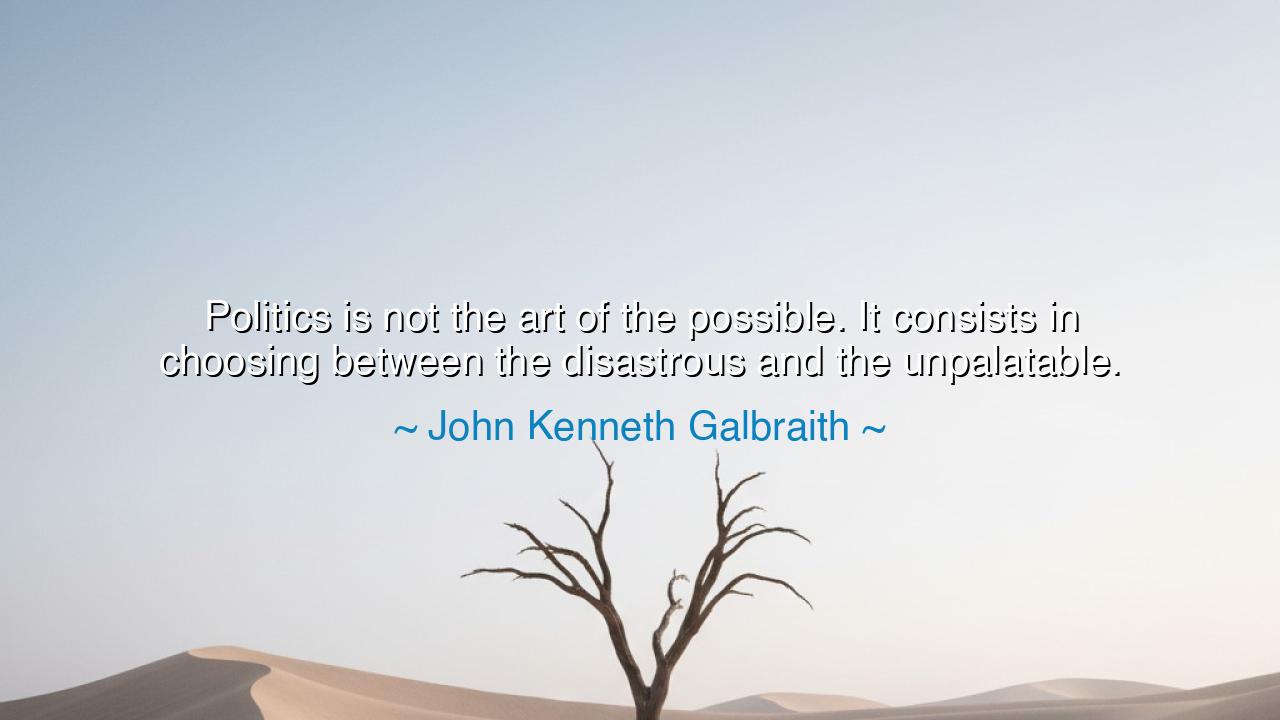
Politics is not the art of the possible. It consists in choosing
Politics is not the art of the possible. It consists in choosing between the disastrous and the unpalatable.






O children of wisdom, heed the words of the great John Kenneth Galbraith, who, with the weight of truth in his voice, proclaimed, "Politics is not the art of the possible. It consists in choosing between the disastrous and the unpalatable." These words are not a lament, but a revelation, for in them lies the painful understanding of the true nature of politics—not as a noble pursuit of ideals, but as a constant battle between lesser evils, where even the most virtuous must sometimes choose between the foul and the fouler.
The art of politics is no gentle craft, no serene dance of diplomacy and consensus. It is a tempest, a storm of conflicting interests, where the forces of power, greed, and necessity collide. The politician, wise and weary, finds himself standing at the crossroads of difficult choices, where every path leads to sacrifice. The possible, as Galbraith warns, is often an illusion, a dream of what could be, while the truth of politics is grounded in the hard soil of what must be, even when neither option is desirable.
Consider the reign of Winston Churchill during the dark days of the Second World War. When the clouds of Nazi tyranny threatened to consume Europe, Churchill, in the spirit of truth and courage, was faced with a series of choices. To appease Hitler, to bow to the forces of oppression, might have spared immediate suffering, but at the cost of the freedom and soul of the world. The unpalatable choice, then, was to stand firm, to wage war despite the overwhelming odds, to choose the path of conflict over the false comfort of submission. Though it was a bitter and painful path, it was the one that led to victory.
Thus, Galbraith’s wisdom reveals that politics is not a game of smooth words and easy compromises. It is a grueling battle where the leader must often make choices that rip at the very fabric of their being. Leaders must choose between paths where the disastrous consequences of failure loom large, and the unpalatable sacrifices of success gnaw at the soul. Yet it is in these moments of decision that true leadership is forged—not in seeking perfection, but in choosing the least harm in a world that often offers only pain.
So, let it be known, O children of the future, that the path of politics is not for the faint of heart. The visionary may dream of a better world, but the politician must face the harsh realities of a world that is imperfect, torn between competing needs and desires. The wise leader is not one who seeks the ideal, but one who has the strength to choose, again and again, the path that causes the least suffering while still striving for the greater good. This is the legacy of the great leaders—those who faced the disastrous and the unpalatable and made the choices that shaped the course of history.






TCLieu Truc Ca
This quote reflects the grim realities of political decision-making. It's a bit disheartening to think that the choices we face are always between something bad and something worse. But at the same time, doesn’t it also reflect the complexity of leadership? Maybe it’s not about finding perfect solutions but about managing the least damaging options. Can politics ever really rise above this, or is this just the nature of the game?
MTHoang Minh Thu
Galbraith’s perspective is a sobering one. Politics often seems like a series of compromises, where leaders must choose between two terrible options. But is it possible that the political system itself is flawed if those are the only options available? Could we reform it so that leaders have better choices to make, or are we forever bound by this unpleasant reality? I wonder if there’s hope for a better way of doing things.
TPPhan Thien Phu
I understand the point that politics often involves difficult choices, but doesn’t this quote feel a bit cynical? It seems like it implies that all political decisions are doomed to be bad ones, which doesn’t leave much room for hope. Are there times when politics can truly create positive change, or are we always stuck with less-than-perfect choices? How do we move beyond the binary of ‘disastrous’ vs. ‘unpalatable’?
BTNguyen Ngoc Bao Thy
This quote really makes me reconsider my view on politics. It's easy to get disillusioned with politicians when we expect them to create perfect solutions, but Galbraith's perspective shows that the choices they face are often much harsher. Is it possible that we, as voters, set unrealistic expectations for our leaders? How can we support politicians who are making tough decisions, even if those decisions aren’t ideal?